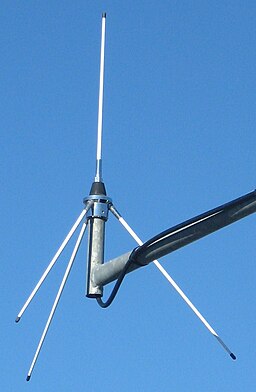Table of Contents
This calculator gives the lengths of the radiating element of a quarter wave (λ/4) ground plane monopole and the radials.
Calculator
Enter
- Frequency or wavelength of operation,
- Velocity factor
- % increase of radial length over the main vertical radiating element (0% means the radial length is the same as the monopole)
and the tool will provide the lengths of:
- Vertical radiating element
- Radials
Example Calculations
A quarter wave (λ/4) antenna designed for 20 meter applications (15 MHz) has a length of 3.3 meters. The length of radials, assuming a 10% increase, is 3.6 meters. This assumes a velocity factor of 0.66.
Background
A quarter-wave antenna, often used as a monopole antenna is mounted vertically and operates effectively over a ground plane. The radials in such an antenna system serve as the “mirror” or counterpoise to the vertical radiating element, simulating a ground plane and thus completing the antenna system.

Length of Radials
For elevated antennas (such as the one shown in the picture above), it’s beneficial for the radials to be resonant, meaning they should be at least a quarter wavelength long at the frequency of operation. This enhances the antenna’s performance by reducing ground losses and improving the radiation pattern. Non-resonant radials can still be used but might not be as effective. Sometimes it is beneficial to increase the length of the radial relative to the main radiating element by a certain % amount.
How many radials should be used?
Ground mounted antennas: Even with as few as 4 radials, the antenna can perform significantly better than with no radials at all. This setup can work for temporary installations or when space and resources are limited.
Elevated Verticals: These antennas require at least 4. However, going up to 8 or more can further enhance the antenna’s efficiency and radiation pattern. While adding more radials improves performance, the improvement per additional radial decreases beyond a certain point. For example, the difference in performance between 4 and 16 radials is more significant than between 32 and 64 radials.
Velocity Factor
The velocity factor (VF) of a transmission medium significantly impacts the physical dimensions of a monopole antenna, particularly its length. It represents the ratio of the speed of an electromagnetic wave in a medium compared to the speed of light in a vacuum. This number affects how the antenna resonates at the desired frequency. A common value for VF is 0.66. This is the default number used in the calculator above.
Velocity factors for different cables are provided here.
